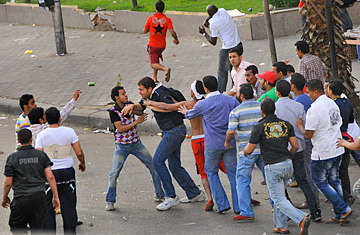
Christians and Muslims clash in Cairo, Egypt, May 8, 2011.
(2 of 2)
The weekend's events are just the latest chapter in a long history of discrimination against the Arab world's largest non-Muslim religious minority. In another incident triggered by a rumored romance between a Christian man and Muslim woman, clashes in March between Muslims and Christians in the town of Helwan killed 13 and also left a church in flames. Earlier this year, a suicide bomber killed 21 people outside a church in Alexandria, sparking several days of protests.
With the end of Mubarak's police state, some observers say that the Salafis and other extremist elements in society are using the perceived security vacuum to enforce their fundamentalist beliefs through intimidation. Others contend that the sectarian tension is being manipulated by ex-Mubarak supporters who don't want to see a democratic Egypt. After all, notes Egyptian blogger Zeinab Mohamed, Mubarak notoriously used such conficts to divide and conquer his own people. "I don't deny we have sectarian problems, but elements of the old regime are now using them to destabilize the revolution," says Mohamed. "This is a test for a new Egypt. For Muslims, Christians, presidential candidates — most of whom didn't even visit the sites of the clashes — everyone must step up."
There's no guarantee the revolution will translate into greater liberalism or tolerance of greater rights for minorities. In fact, it might mean the opposite. Shadi Hamid, director of research at the Brookings Doha Center, thinks the weekend's incidents highlight the growing influence of the Salafis, even though they've denied involvement. "We can't deny the rise of the Salafis, they've come out of the woodwork," says Shadi Hamid, director of research at the Brookings Doha Center. While he believes the group has internal divisions of its own to contend with — not least over the nature of their political participation — "they're dragging the political spectrum to the right and quickly becoming a political force to be reckoned with." As the Muslim Brotherhood has adopted a more pragmatic political platform, he says, it's lost some religious hardliners to the Salafi movement; indeed the Brotherhood now sees the Salafis as their main electoral competition in Egypt's eventual elections.
"There are people who want an Islamic state. And they'll fight for it," says Egyptian journalist Yasmine El Rashidi, who's been following the sectarian tensions for nearly a decade. "It's a less a question of how many they are, but of how much of an impact they can have. And as we saw on Saturday, it's a huge impact."
The unrest is yet another reminder that unseating Mubarak did not magically fix Egypt's social problems — and nor will the current military-run administration. Change will only come over time, believes the Egyptian Initiative for Personal Rights' Bahgat. "We need to be brave enough to acknowledge that this is us — that these are the problems we have, we are a society that needs to go through a comprehensive healing process after decades of dictatorship," he says. "We're reinventing ourselves."
